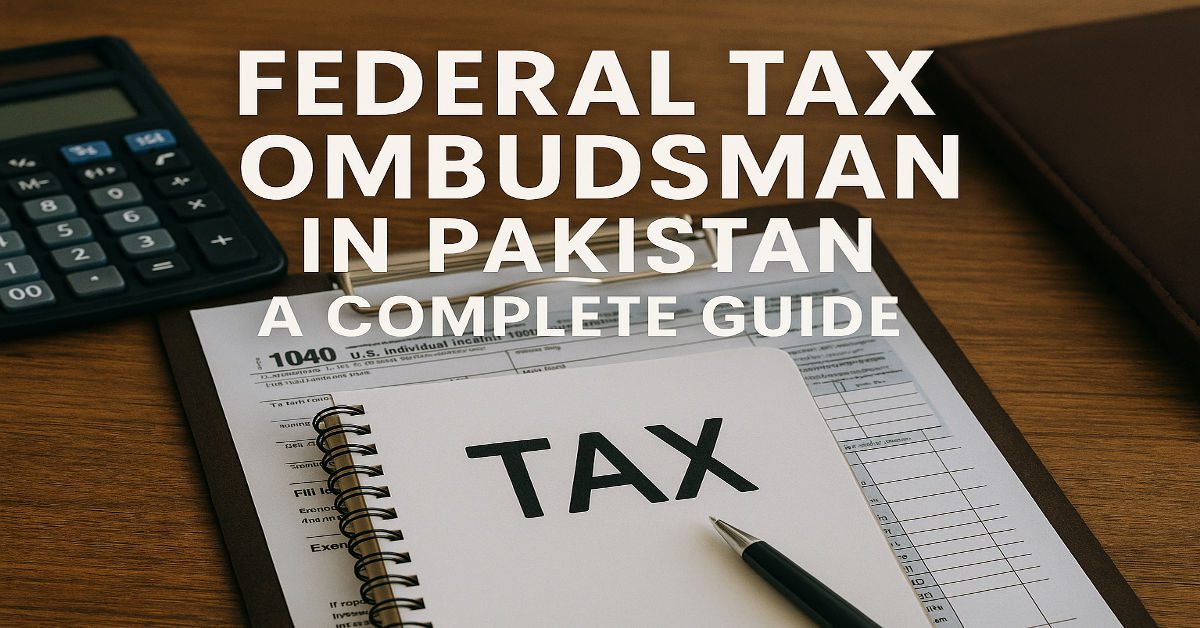The Federal Tax Ombudsman (FTO) is an independent institution in Pakistan created to provide citizens and businesses with a fair platform for addressing grievances related to tax administration. Established in 2000 under the President’s Order, the FTO ensures transparency, accountability, and justice within the Federal Board of Revenue (FBR). Its purpose is to bridge the gap between taxpayers and authorities, ensuring that complaints are resolved without unnecessary delays or biases. This system helps build trust between the government and the people, promoting voluntary tax compliance and reducing disputes.
Why the Institution Was Established
Before the creation of the FTO, taxpayers often struggled with long delays, lack of transparency, and limited avenues for complaint resolution. Recognizing the need for an impartial body, the government introduced the Ombudsman’s office. It was inspired by international practices where taxpayer rights are safeguarded through similar institutions. The establishment of this office has brought positive changes, such as reducing red tape, improving complaint handling, and providing taxpayers with an affordable and accessible means of justice.
Role of the Tax Ombudsman
Its main function is to investigate complaints regarding maladministration by FBR officials. The Federal Tax Ombudsman plays a vital role in protecting taxpayer rights. These issues may include delays in processing refunds, harassment by tax officers, misinterpretation of tax laws, or unjustified tax demands. Importantly, the FTO does not replace courts or tribunals but provides an alternative dispute resolution mechanism that is quicker and less expensive. By offering free services, the Ombudsman ensures that taxpayers of all income levels have equal access to justice.
How Complaints Are Filed and Processed
Filing a complaint with the FTO is designed to be straightforward. Taxpayers can submit complaints online, through written applications, or by visiting regional offices across Pakistan. Once received, the FTO reviews the matter and seeks responses from the concerned FBR officials. Hearings may be scheduled if needed, ensuring that both sides are given fair opportunities to present their case. After careful consideration, the Ombudsman issues findings and recommendations, which are binding on the tax authorities. This process reduces the need for lengthy litigation in higher courts.
Major Achievements of the Institution
Over the years, the Ombudsman’s office has delivered many important decisions that strengthened taxpayers’ confidence. Thousands of refund cases have been resolved, and many instances of undue harassment have been corrected. The FTO’s recommendations have also pushed the FBR to adopt more taxpayer-friendly policies. For example, improvements in digital filing systems and complaint management can be traced back to the Ombudsman’s insistence on fair practices. This demonstrates the institution’s influence in shaping a more transparent tax system in Pakistan.
Impact on Taxpayers’ Trust
Knowing there is an independent body available gives people the confidence to engage with the tax system. The presence of the Federal Tax Ombudsman has significantly improved trust among taxpayers. Small businesses, salaried individuals, and exporters have especially benefited from the FTO’s intervention in refund disputes and unjust tax assessments. By reducing unnecessary confrontation between taxpayers and the FBR, the Ombudsman plays a crucial role in strengthening Pakistan’s tax culture. Ultimately, this also supports national revenue collection by encouraging compliance.
Challenges Faced by the Ombudsman’s Office
Despite its progress, the FTO faces challenges in fully achieving its mandate. Many taxpayers remain unaware of its role and functions. There are also instances where tax officials delay implementing the Ombudsman’s recommendations, causing frustration. Additionally, some complex disputes require policy-level reforms, which are beyond the direct powers of the FTO. Increasing awareness campaigns, ensuring stricter enforcement of orders, and strengthening coordination with the FBR are necessary steps to overcome these challenges.
Future Prospects and Reforms
The future of the FTO looks promising if reforms are adopted to enhance its efficiency. Expanding digital complaint filing, increasing outreach in rural areas, and organizing taxpayer education programs can further improve its accessibility. Moreover, introducing stronger legal mechanisms to enforce compliance with FTO recommendations will give taxpayers greater assurance. By modernizing its operations and ensuring timely resolution of complaints, the Ombudsman can play an even more significant role in creating a fair and transparent tax environment in Pakistan.
Conclusion
The Federal Tax Ombudsman has emerged as a vital institution for protecting taxpayer rights in Pakistan. By addressing complaints of maladministration, ensuring accountability within the FBR, and promoting transparency, the Ombudsman strengthens both trust and compliance. Although challenges exist, the ongoing reforms and growing awareness about the institution show a positive future. A stronger Ombudsman system will not only benefit taxpayers but also contribute to building a fairer tax culture and supporting Pakistan’s economic growth.
FAQs
Q1: Is filing a complaint with the Tax Ombudsman free of cost?
Yes, the process is completely free for all taxpayers.
Q2: Can the FTO overrule decisions of the FBR?
The FTO can recommend corrective actions, and its findings are binding, but it does not act as a court of law.
Q3: How long does it take to resolve a complaint?
In most cases, complaints are resolved within a few months, depending on the complexity.
Q4: Can small businesses file complaints with the Ombudsman?
Yes, both individuals and businesses of any size can file complaints against FBR officials.
Q5: Where can taxpayers file their complaints?
Complaints can be submitted online through the FTO’s official website or in person at regional offices across Pakistan.


Leave A Comment